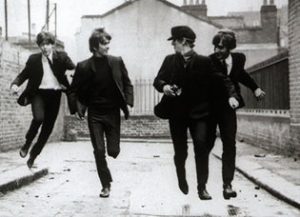Here’s a sneak preview of Bob Dylan’s forthcoming Christmas album. It will hit the streets in October, and you can pre-order now. A safe assumption: this will be a “love it” or “hate it” album.
Here’s a sneak preview of Bob Dylan’s forthcoming Christmas album. It will hit the streets in October, and you can pre-order now. A safe assumption: this will be a “love it” or “hate it” album.
 On September 9th, EMI released a remastered version of the entire Beatles catalogue — the first remix since 1987. And now the Beatles are once again back on top of the charts. If you’re wondering whether to buy the remastered versions at all, or whether to buy the stereo or mono box sets (or some combination of the two), or if you’re simply wondering what goes into remastering the Fab Four’s complete body of work, then you will be interested in this interview with Beatles historian Kevin Howlett, who helped write the liner notes for the new releases. In this conversation with NPR’s All Songs Considered (MP3 — iTunes — RSS Feed), Howlett describes what the remastering involved, and then compares the old versions to the new versions (both mono and stereo). When you’re done listening to this 20+ minute interview, you’ll have a much better sense of what this long-awaited remastering delivers. You can listen with the player below, or via the links posted above.
On September 9th, EMI released a remastered version of the entire Beatles catalogue — the first remix since 1987. And now the Beatles are once again back on top of the charts. If you’re wondering whether to buy the remastered versions at all, or whether to buy the stereo or mono box sets (or some combination of the two), or if you’re simply wondering what goes into remastering the Fab Four’s complete body of work, then you will be interested in this interview with Beatles historian Kevin Howlett, who helped write the liner notes for the new releases. In this conversation with NPR’s All Songs Considered (MP3 — iTunes — RSS Feed), Howlett describes what the remastering involved, and then compares the old versions to the new versions (both mono and stereo). When you’re done listening to this 20+ minute interview, you’ll have a much better sense of what this long-awaited remastering delivers. You can listen with the player below, or via the links posted above.
Related Content:
What New Yorkers Heard on the Radio the Night John Lennon was Shot
The Beatles: Podcasts from Yesterday
The Grey Video: Mixing the Beatles with Jay‑Z
The US Justice Department officially weighed in today on the Google Books settlement with publishers and authors. On the plus side for Google, the government wants to see the project continue because it has clear social benefits. On the downside, the DOJ has concerns about antitrust and copyright issues, and it’s looking for the deal to get restructured. You can get more details in The Wall Street Journal. It’s late. I’m out.
Related Content:
Google Book Search: A Disaster for Scholars?
A quick heads up: Lifehacker is highlighting today some new software (Windows only) that will let you download free access/public domain texts from Google Book Search and then turn them into neat PDF files. To get tips on how to use the software created by a third party, not Google, head on over to Lifehacker. I haven’t personally used the Downloader, mainly because I work on a Mac. If you try it out, let us know how the software works for you.
Here we are. One year after the fall of Lehman Brothers. And here we have Michael Lewis, the author of Liar’s Poker, talking about his next book — The Big Short: Inside the Doomsday Machine (2010) — that looks at those people who actually understood that Wall Street was going to blow up. Most of the banking community didn’t see it coming. (Happy anniversary Dick Fuld.) But a handful saw the writing on the wall and took the big short bet. You can get Lewis’ complete talk here.
Just a quick fyi: Audible.com is giving away a free chapter (in audio) from a new book, Uranium Wars: The Scientific Rivalry that Created the Nuclear Age (preview it on Amazon here). Written by Amir Aczel, a skilled popular science writer, the book takes a close look at the scientists who discovered the destructive potential of uranium and launched the beginning of the nuclear age. Since the book has been getting good reviews, I thought that I’d flag this free giveaway. Also, as mentioned here before, Audible runs a regular promotion that will let you download a free audiobook of your choice (for example, Uranium Wars) if you start a 14 day free trial. Once the trial is over, you can continue your Audible subscription, or cancel it, and still keep the free book. The choice is yours. You can initiate that process here.
Visit msnbc.com for Breaking News, World News, and News about the Economy
Harvard philosophy professor Michael Sandel appeared on the Today Show this morning, and got four minutes to make the case for philosophy. If you’re not familiar with him, Sandel is a very popular Harvard professor. Some 15,000 students have taken his courses over 30 years, and to get a feel for his teaching, you can watch his 30-minute lecture online. It’s called Justice: A Journey into Moral Reasoning, and it’s one of the very few open lectures that Harvard has put online. (A disappointment, I must say.) The lecture also otherwise appears in our collection of Free University Courses. Finally, I’d also encourage you to listen to the series of lectures that Sandel presented through the BBC. We featured them here before, and we’re glad that Tamas, one of our readers, has reminded us of them.